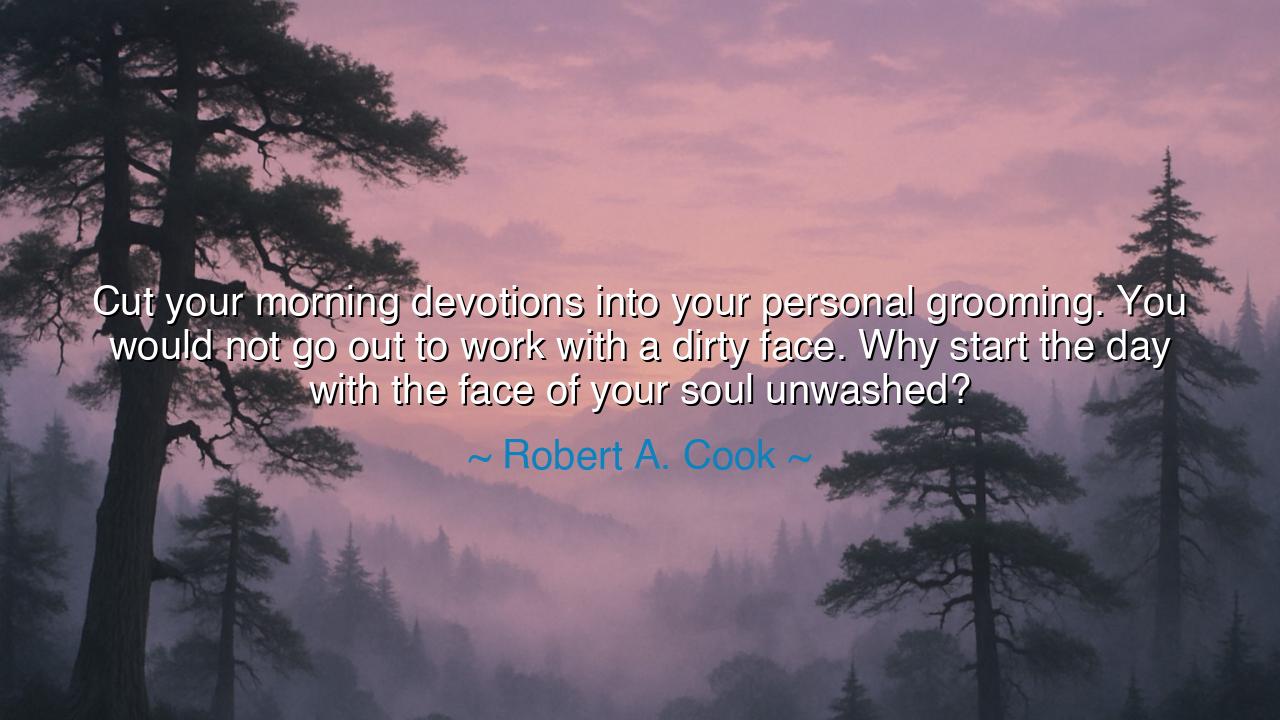
Cut your morning devotions into your personal grooming. You
Cut your morning devotions into your personal grooming. You would not go out to work with a dirty face. Why start the day with the face of your soul unwashed?






Robert A. Cook, teacher and preacher of the soul, once offered this guiding wisdom: “Cut your morning devotions into your personal grooming. You would not go out to work with a dirty face. Why start the day with the face of your soul unwashed?” In these words, he binds together the disciplines of body and spirit, reminding us that just as no man or woman would dare face the public with grime upon their skin, so too should none face the burdens of the day with a spirit neglected and unprepared.
The image of the dirty face strikes powerfully, for it is something all can understand. To step into the world unwashed is to carry a visible mark of neglect, and society itself recoils from such disorder. Yet how often do men and women polish their outward appearance while leaving their souls burdened with anger, fear, or despair? Cook asks us to see the invisible with the same seriousness as the visible: if we would wash the body in the morning, why not also cleanse the heart through prayer, reflection, or devotion?
The phrase morning devotions recalls the ancient practice of beginning the day with sacred ritual. The monks of the desert rose at dawn to chant psalms, aligning their spirits before any labor. The samurai performed morning meditation to still their minds before battle. Even the kings of old often bowed in prayer before ruling their courts. They all understood what Cook teaches: the day is too perilous to face with an unwashed soul, and strength flows from beginning with reverence.
History bears witness to this truth. Consider George Washington, who during the Revolutionary War was known to rise early for private prayer before engaging with soldiers and strategists. His calm strength, seen in the darkest hours of the struggle, was not merely the fruit of discipline but of this unseen washing of the spirit. Or recall Mahatma Gandhi, whose daily devotions grounded his strength to resist an empire without violence. These lives show that inner cleansing each morning is not ritual alone but the very foundation of enduring courage.
The deeper meaning of Cook’s metaphor is balance. A man may polish his shoes, comb his hair, and straighten his tie, yet stumble in anger and weakness because he has neglected the greater work of soul-preparation. Outward grooming presents the body to the world; inward devotion presents the heart to life itself. To begin without the second is to step into the day half-armed, carrying a shining exterior but a weary, unready spirit.
The lesson is clear: do not neglect the unseen. Just as the mirror reveals the blemishes of the skin, so too must reflection and devotion reveal the blemishes of the heart. To wash them away through prayer, meditation, or quiet gratitude is to step into the world truly clean, ready to face both men and God with integrity. The man who tends only to the body deceives himself, but the man who tends both body and soul walks in true wholeness.
Practical action flows: as you brush your teeth and wash your face, give equal care to your inner self. Take a few moments each morning to breathe, to pray, to read a word of wisdom, or to set your heart in gratitude. Let this become as habitual as your grooming, so that no day begins with the face of your soul unwashed. In this way, your life will shine not only with outward respectability but with inward strength.
Thus Robert A. Cook’s words endure as both warning and encouragement. Children of tomorrow, remember this: no warrior goes to battle with rusted armor, and no soul should go into the day uncleansed. Begin each dawn by washing both body and spirit, for this double cleansing will give you strength that neither toil nor trial can stain.






AAdministratorAdministrator
Welcome, honored guests. Please leave a comment, we will respond soon